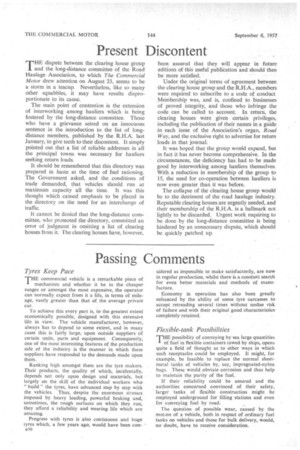Present Discontent
Page 36

If you've noticed an error in this article please click here to report it so we can fix it.
THE dispute between the clearing house group and the long-distance committee of the Road Haulage Association, to which The Commercial Motor drew attention on August 23, seems to be a storm in a teacup. Nevertheless, like so many other squabbles, it may have results disproportionate to its cause.
The main point of contention is the extension of interworking among hauliers which is being fostered by the long-distance committee. Those who have a grievance seized on an innocuous sentence in the introduction to the list of longdistance members, published by the R.H.A. last January, to give teeth to their discontent. It simply pointed out that a list of reliable addresses in all the principal towns was necessary for hauliers seeking return loads.
It should be remembered that this directory was prepared in haste at the time of fuel rationing. The Government asked, and the conditions of trade demanded, that vehicles should run at maximum capacity all the time. It was this thought which caused emphasis to be placed in the directory on the need for an interchange of traffic.
It cannot be denied that the long-distance committee, who promoted the directory, committed art error of judgment in omitting a list of clearing houses from it. The clearing houses have, however, been assured that they will appear in future editions of this useful publication and should then be more satisfied.
Under the original terms of agreement between • the clearing house group and the R.H.A., members were required to subscribe to a code of conduct Membership was, and is, confined to businesses of proved integrity, and those who infringe the code can be called to account. In return, the clearing houses were given certain privileges, including the publication of their names in a guide in each issue of the Association's organ, Road Way, and the exclusive right to advertise for return • loads in that journal.
It was hoped that the group would expand, but in fact it has never become comprehensive. In the circumstances, the deficiency has had to be made good by interworking among hauliers themselves. With a reduction in membership of the group to 15, the need for co-operation between hauliers is now even greater than it was before.
The collapse of the clearing house group would be to the detriment of the road haulage industry. Reputable clearing houses are urgently needed, and their membership of the R.H.A. is a hallmark not lightly to be discarded. Urgent work requiring to be done by the long-distance committee is being hindered by an unnecessary dispute, which should be quickly patched up.




























































































































